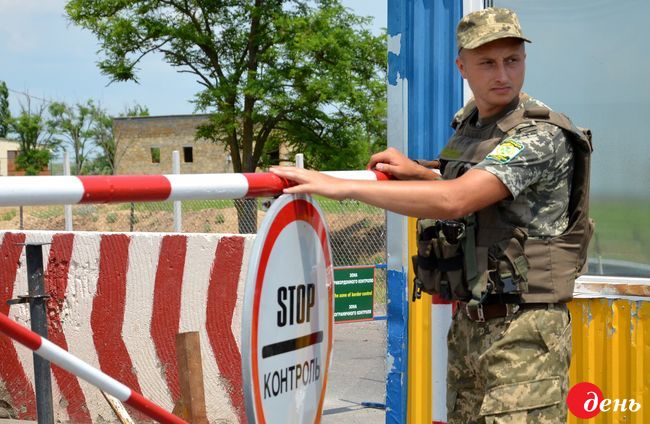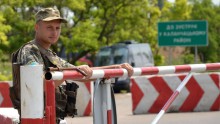The Russian aggression in Ukraine has been ongoing for over a year. Annexation of Crimea remains a serious legal challenge to the state and to the ordinary citizens on both sides of the border, barbarically cut by the invader. On the administrative boundary (de-facto – on the state border) with Crimea Ukraine organized three road checkpoints: Chonhar, Chaplinka, and Kalanchak; as well as four railway ones: Kherson, Vadym, Novooleksiivka, and Melitopol.
Decree No. 367 of the Cabinet of Ministers from June 4 regulates entry and departure procedures. According to it, citizens of Ukraine may enter and leave Crimea by the document that confirms Ukrainian citizenship, and foreigners should have a passport and a special permission from the State Migration Service. Crossing the aforementioned checkpoints does not involve cross passing over the state border, though the measures are very similar. We visited one of these facilities and learned how citizens traverse the line that divides us from the occupied Crimea.
THE QUEUES HAVE DISAPPEARED
Only a couple of months ago Kalanchak had kilometer-long queues of trucks, being stalled there for weeks. The reason of these delays was the slow work of customs officers from the other side. Russian officials hampered delivery of goods from the mainland under various pretexts. But, according to our border guards, following a number of materials in the Ukrainian media, self-proclaimed Crimean government gave instructions to speed up the process of registration. And the queues disappeared quickly. Not surprisingly, since 90 percent of the goods that are being taken to the peninsula is food, while the trucks from Crimea are coming empty. Summer season has not increased the freight traffic. The lorry drivers have no claims to either controlling party. If the documents are in order and the goods are declared properly it is no problem to pass. But at the same time, the drivers say: “Nobody needs these borders.”
“The travels become unprofitable, there are almost no orders – not like before. So, I was forced to shut down my business. Right now I am going to Vinnytsia for strawberries. Everyone has to try their best to survive, buying, selling, earning what they can,” says Volodymyr from Krasnoperekopsk. “I am not happy at all with this situation. I have ten months before retirement left. And my pension will be minimal – 5,850 rubles. How will I live on them? Prices are twice or even three times greater than in Ukraine. And furthermore: if there were no goods transported from the mainland, shops would be half-empty.”
Occasionally, someone tries to smuggle prohibited or incorrectly declared cargo through the checkpoint: currency, forged documents, drugs, weapons, items of military use. Border guards look out most closely for the latter. For every such finding they cooperate with SBU and other security agencies, because some terrorists travel to the ATO zone from Crimea.
PUBLIC CONTROL
Community volunteers also help border guards and customs officers on the checkpoint. They are the local self-defense force and citizens who expressed their desire to monitor the situation on the boundary. They have a workplace equipped at the station, where the common citizens may follow their requests. The main purpose of their presence is preventing corruption among border control services and assistance to citizens in creating conditions for comfortable border crossing.
From what we’ve seen, it is difficult to say how effective these measures are. But the border guards themselves insist that this is important, because they do not hide the fact that their service may have dishonest employees – just like any other. Additional public scrutiny reduces the likelihood of extortion and other undue profits.

THE CHECKPOINT HAD MORE OR LESS ACCEPTABLE WORKING CONDITIONS ARRANGED PAST YEAR: SITES FOR SERVICE AND RECREATION, CUSTOMS OFFICE, WIDE ROADWAY, FENCES, OBSERVATION TOWERS, ETC. / Photo by the author
“We want the staff to have no preconditions at all for any kind of corruption. We understand that work may not be perfect, but the employees should strive for it. That’s why we do not shut away from the public and we want them to help fighting unfairness among border service employees,” says Colonel Andrii Bazan, Assistant Chief of the Azov-Black Sea regional administration of the State Border Guard Service of Ukraine. “In addition, people who pass the checkpoints have the opportunity to get free advice on the procedure.”
TROOP MOVEMENTS
Recently Ukrainian information agencies have spread the news from our border guards, that they found camouflaged positions of Russian troops on the border with Crimea, in Chonhar direction. There were armored vehicles, tanks, and “Grad” vehicles. Bazan explains that this information was out of context and sensationalized to appear as something hot: “In fact the Russians are constantly moving and masking their vehicles along the border. We are observing this. That case was not something unusual,” says the colonel. “The very presence of military from the other country is a stress. But we had no extraordinary events or provocations recently.”
THE SENTIMENT
The crowds at the passport control windows and in the neutral zone are not large. Everything happens without haste. It seems that everyone perceives this procedure as a mere formality. Document verification, a car review with a service dog, a stamp on the pass ticket – and “bon voyage.” On average, when leaving Crimea it takes one hour to pass both sides of the control. In the opposite direction – more than three hours due to meticulous checking in Russian customs.
Despite the start of the holiday season, Ukrainians en masse do not go to Crimea, although lovers of the local nature admit that they are going to the peninsula as before. And some of them are openly indifferent to Russian aggression and annexation. However, everyone is disappointed because of high prices on the peninsula. Frequent travelers take dairy products, meat, cigarettes, and even bread from Ukraine. They say everything is much more expensive in Crimea. Instead they leave peninsula with a full tank of gasoline – it is almost twice cheaper than in Ukraine.
“Our family is split over the issue. Someone supports the departure of Crimea, someone is for united Ukraine. Personally, I am not going to take Russian citizenship, though I have business, property, and relatives there,” says Serhii from Dnipropetrovsk. “I’m in Crimea every two months. I am used to crossing the border, although the procedure is not something that anyone might like. I have no complaints about our side, but the Russians can close the window in front you without any explanations, and you have to stand there for half an hour. And the others say that if someone starts to get nervous, the Russian military comes and threaten to have those sent back.”
A Crimean Tatar on SUV waits in the line. Seeing journalists, he smiles and asks whether we are going to take an interview, speaking only Ukrainian. “I do not want to speak Russian, and I am trying to speak the official language when I’m in my country,” says the man and asks not to publish his name. “Why? Because now in Crimea the rights of those who do not love Russia are violated. You cannot disagree to love it, because they call it dissent. And that pushes me away from Russia. All these changes have brought a lot of problems, although I did not feel any pressure on my business. I can tell you that all my friends are for Ukraine, you should not think that we forgot our country. But these are circumstances above us. We are waiting.”







